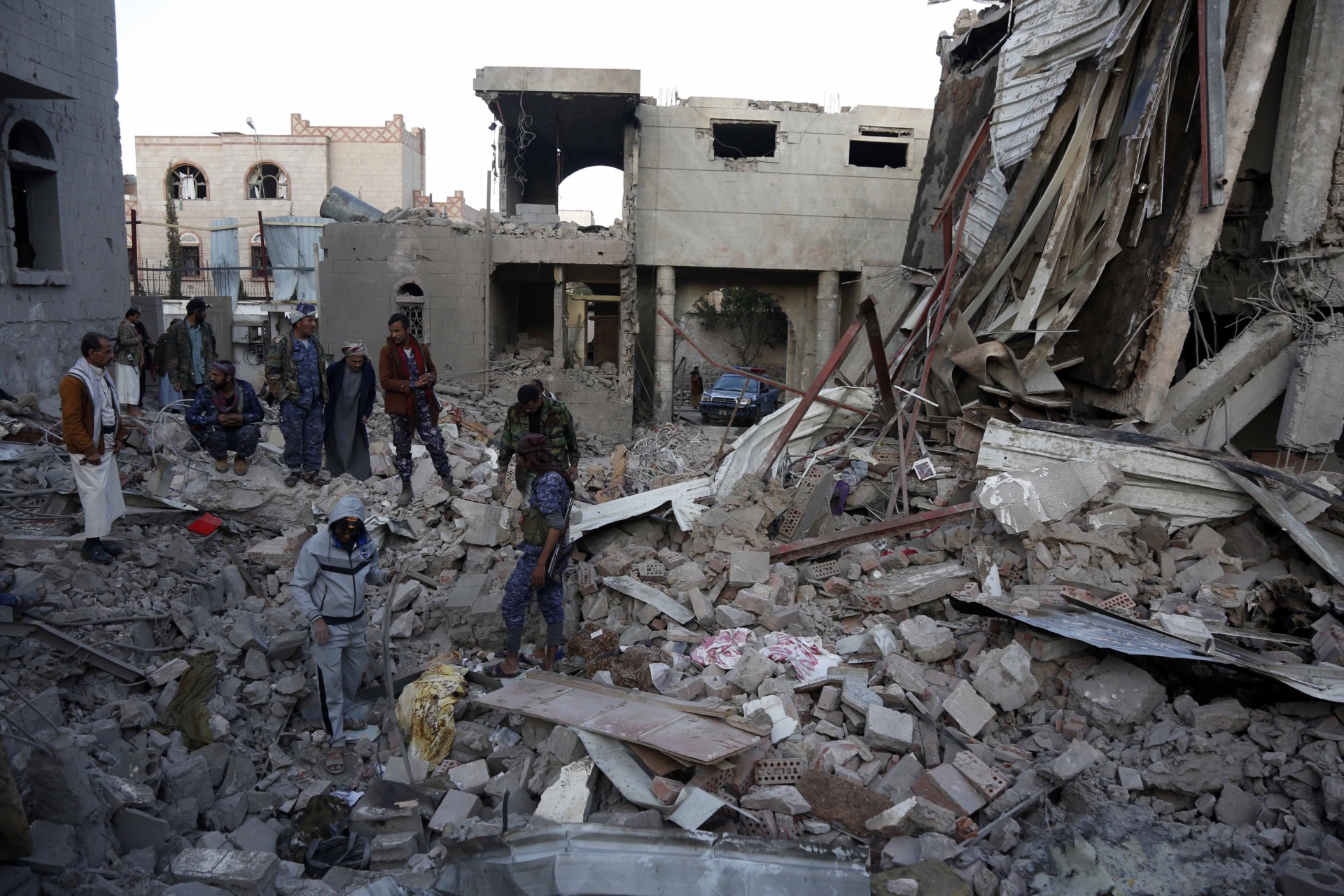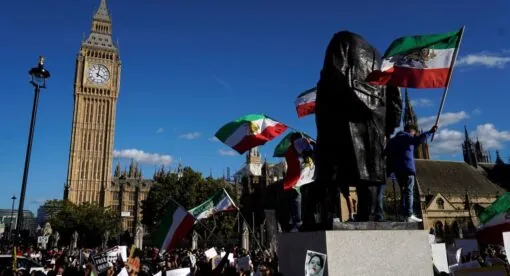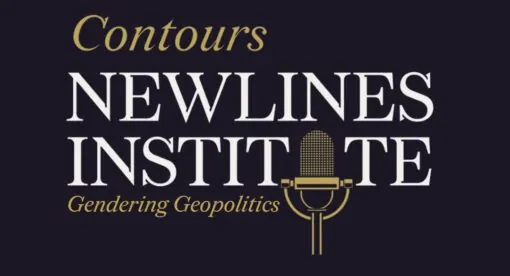Al-Houthi rebels’ military maneuvers, including a recent major offensive in central Yemen and strikes against Abu Dhabi, are pulling the United Arab Emirates and United States back into the Saudi-led coalition’s intervention in Yemen after both attempted to downgrade their involvement. The dynamics of the civil war will incentivize the U.S. and its coalition partners to focus on narrow goals to discredit the alHouthi fighters’ military-first strategy, especially by supporting Saudi-led coalition military action that pushes back the rebels’ front lines. But miscalculations in this pushback could embolden Gulf Arab and Yemeni behavior that worsens Yemen’s humanitarian conditions while doing little to address the rebels’ increased abilities to hit Gulf Arab targets.
The U.S. Attempts a Yemen Reset
When the administration of U.S. President Joe Biden took office in January 2021, it came with a pledge to improve the humanitarian situation in Yemen, , by cutting military aid to Gulf Arab allies to reduce their military role there, and by improving relations with the al-Houthi movement to convince them to negotiate an end to the civil war. To that end, the administration reversed the Trump administration’s designation of the Houthis as a Foreign Terrorist Organization (FTO) in February 2021. Weeks later, al-Houthi fighters began a major offensive to take Marib province in central Yemen, a strategic location hosting major energy reserves and a million refugees. The offensive essentially put the diplomatic process on ice.
The offensive at Marib signaled that pressure on the Saudi-led coalition alone would not ultimately be enough to bring about peace talks. As the U.S. signaled that it would resume support for the Saudis despite campaign pledges to punish Riyadh for its human rights record, the coalition felt emboldened to push back against the al-Houthi rebels. In January 2022, Emirati-backed forces, the Giants Brigade, took Shabwa province on Marib’s southern flank, substantially weakening the rebels’ position along the frontline.
Al-Houthis fighters allegedly responded with strikes against Abu Dhabi on Jan. 17 and Jan. 24; the first killed three foreign workers, and the second activated U.S. defenses at Al Dhafra Air Base. The attacks broke the long quiet the UAE had enjoyed despite years of regional military interventions and created a new, overt threat to Westerners in the Gulf. It caused the U.S. to grow closer to the Saudis’ own military objectives in Yemen, setting the stage for at least a partial restoration of U.S. support for military pressure on the al-Houthi rebels. On Jan. 25, U.S. National Security Advisor Jake Sullivan promised his Emirati and Saudi counterparts to hold the rebels accountable for their actions.
Paths Forward
In the near term, the Emiratis and U.S. are likely to militarily and diplomatically compartmentalize the attack into solely the Yemen conflict rather than expanding their response to the Houthis’ ally, Iran, despite the likelihood of Iran supplying both the technology and military guidance to carry out the attack. Neither the UAE nor U.S. is interested in escalating with Iran directly, especially when the U.S. is still negotiating over Iran’s nuclear program, while Saudi Arabia has been careful to avoid escalation with Iran out of concern it could alienate Washington during its ongoing U.S. strategic review of the U.S.-Saudi relationship and drag the Kingdom into a major war with Tehran. Instead, the Emiratis will focus on retaliation within Yemen, targeting launch sites and trying to de-escalate tensions on the front lines, as they did when they pulled the Giants Brigade back from captured territory in Shabwa. They’ll also maintain their aggressive lobbying in Washington to restore the U.S. designation of the al-Houthi fighters as an FTO. Both actions will preserve the UAE’s long-term goal in south Yemen: building up allies in the Southern Transitional Council (STC) and keeping the Houthis from retaking key cities, like Aden.
The Abu Dhabi attacks also serve some Saudi interests. Riyadh, Jeddah, Jazan, and other Saudi cities live under the threat of attack from the al-Houthi rebels’ drones and missiles; Saudi pleas for missile and drone defenses will be better received in Washington now that the Houthis have escalated their regional campaign to the UAE. Saudi Arabia will also likely get a freer hand from the U.S. to conduct air operations against the rebels; shortly after the attacks on Abu Dhabi in January 2022, a Saudi-led air campaign returned to destroying targets in Sana’a and the Houthi spiritual home, Sa’dah. Even as these strikes have killed scores of civilians, U.S. protests have been comparatively muted.
Meanwhile, the United States is grappling with the reality that the al-Houthi rebels are not yet in the mood to negotiate a cease-fire. Unfortunately for the prospects of an immediate cease-fire, hawks in the rebels’ Supreme Revolutionary Committee are still driving policies, increasing risks to U.S. forces and their allies regionwide. To begin, the U.S. will likely focus on deterring future strikes on the UAE and U.S. forces, providing intelligence and logistical support for coalition missions against rebel missile launch sites and improving interdiction efforts to stop smuggled Iranian technology. To that end, the U.S. in early February announced the deployment of new fighter jets and the USS Cole to the United Arab Emirates.
The U.S. will also need to go beyond this, however, if it wants to convince the rebels to abandon their military-first policies and deter future strikes on the Emirates. U.S. support – diplomatic, logistical, and intelligence – to break the siege of Marib could convince the rebels that they do not have a viable military path forward and embolden the factions that favor negotiations. Beyond U.S. naval support to interdict Iranian smuggling, U.S. forces do not need to directly involve themselves beyond limited intelligence gathering, reducing the risk to U.S. forces. However, if the siege of Marib is broken, the al-Houthi fighters may decide to escalate with another swarm attack on the UAE, including on U.S. forces there. If that happens, Washington might need to send a stronger signal of military deterrence to the Houthis directly, similar to the limited airstrikes used on Iranian-backed militias in Iraq and Syria or the October 2016 U.S. Navy strikes on rebel targets in Yemen after a failed missile attack. Such attacks would not intentionally signal the beginning of an expansive military campaign, though they do create a risk of cycles of escalation and retaliation.
The U.S. will be incentivized to be cautious not to be dragged into the civil war by limiting the scales of intervention and letting the Saudi-led coalition lead the response and absorb the potential retaliation. However, even this could have unintended consequences: increased U.S. support could cause the Saudi-led coalition to become too aggressive. The U.S. is less likely to be pulled into a cycle of retaliation if it only provides support for military action beyond targeting rebels’ launch sites and breaking the siege of Marib; if it does, it could convince the Saudi-led coalition, and in particular, less disciplined Yemeni forces, that they have a blank check from Washington to carry the war deep into the north – and if they believe this, they might overextend themselves, collapsing the front lines again and giving the al-Houthi fighters a fresh opening to push south.
Finally, the United States is unlikely to find the cudgel of the FTO designation useful in this paradigm; to enact it will complicate humanitarian flows into Yemen and embolden al-Houthi hawks while doing little to change the Marib frontline or deter attacks across the Gulf. Rather, leaving the FTO designation aside will help convince the rebels that U.S. goals are limited and not a new “maximum pressure” campaign but at shifting the dynamics back to diplomacy. It would also achieve a vital moral purpose of allowing humanitarian aid to flow unimpeded. The U.S. might also consider increasing its foreign aid to Yemen as well to further demonstrate it is not moving back to a “maximum pressure” campaign.
The U.S. hand is increasingly being forced by Houthi attacks, but this does not mean it must rush into a fresh conflict or support an expansive campaign against the al-Houthi rebels. Targeted retaliations with regional allies might be enough to convince them that their militaristic approach to the civil war is unlikely to produce the breakthroughs they seek and could restart the talks that might finally freeze the conflict enough to improve its humanitarian situation.
Ryan Bohl is a geopolitical thinker, educator, and writer. He currently serves as a senior analyst for the Middle East at Stratfor, a private intelligence forecasting firm, where he specializes in Gulf economic and political developments. His work has appeared in Time Magazine, Al-Arabiya News, Al-Jazeera, Salon Magazine, World Politics Review, The Atlantic Sentinel, and other outlets.
The views expressed in this article are those of the author and not an official policy or position of the New Lines Institute.







